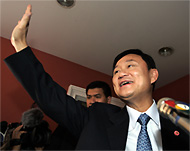Interim Thai prime minister takes over
Thailand has appointed a new interim prime minister a day after the resignation of Thaksin Shinawatra, but uncertainty remains over the country’s political future.

Chidchai Vanasatidya, Thaksin’s former deputy, will take up the office while Thaksin is “taking a rest”, a government spokesman said on Wednesday.
However, Thaksin could take back the job if necessary, the spokesman added without elaborating.
On Tuesday, less than a day after going on national television to claim victory in the weekend’s national election, Thaksin appeared again saying he planned to take a “political break”.
His decision came after months of street protests in Bangkok with mainly middle-class demonstrators and opposition parties calling for him to step down over his personal business dealings.
The move was broadly welcomed by the Thai media, but uncertainty over a more permanent successor has led some analysts to warn that the country’s political turmoil could be far from over.
Wednesday’s edition of the stridently anti-Thaksin newspaper the Nation described his departure as “a source of great relief for the nation” and time for national reconciliation”.
The Thai-language business daily Krungthep Thurakit called on Thaksin to honour his promise to submit to an investigation into the sale of family-owned telecoms giant Shin Corp to a company in Singapore.
But the Bangkok Post sounded a more cautious note, warning that further mass demonstrations organised by the People’s Alliance for Democracy (PAD) would only increase the current political malaise.
Uncertain succession
 |
|
Thaksin says he is taking a break |
“With the flashpoint removed, the most immediate matter is the promise made yesterday by the PAD to cease their street protests,” it said.
Protestors, led by the media magnate Sondhi Limthongkul, have threatened to take to the streets again if Thaksin does not bow out of politics entirely.
Just who Thaksin’s eventual successor will be is unclear.
But aside from finding a new leader, Thailand needs to solve a constitutional problem affecting the formation of parliament after the general election.
Despite the fact that Thaksin enjoys strong support in rural Thailand and looked set to win a majority in the weekend’s poll, the decision by the main opposition parties to boycott the vote has left 39 districts with no elected representative and the country in a political mess.
Crisis resolution
John Brandon, director of international relations at the Asia Foundation, told AFP Thaksin’s decision would do little to resolve the immediate hurdles to forming a new parliament.
“I think it’s an important step to help resolve the crisis,” he said of Thaksin’s resignation. “The next big step is how (to resolve) what happened with the results of the current election.”
 |
|
An opposition boycott of elections |
All 500 seats must be filled for parliament to convene. The Election Commission plans by-elections on 23 April and will re-open the nomination process for those seats in hopes of attracting new candidates.
Although he did not mention any plans for the future on Tuesday night, both Thaksin and the political opposition have spoken of creating a special assembly that would amend the constitution – essentially to weaken the powers of the prime minister.
Once the new interim parliament convenes, Thaksin has said that process could take up to 15 months before new elections, which the opposition says it is ready to join.
Elsewhere the protestors who had campaigned on the streets for two months rejoiced at the news of the prime minister’s departure.
One group even made one last march to bid the prime minister a symbolic farewell and held a mock funeral outside his office.
Carrying a casket and waving potent incense, a half dozen protestors set the casket on the pavement across from the gates of Thaksin’s office and lit a small bonfire where they burned paper flowers.